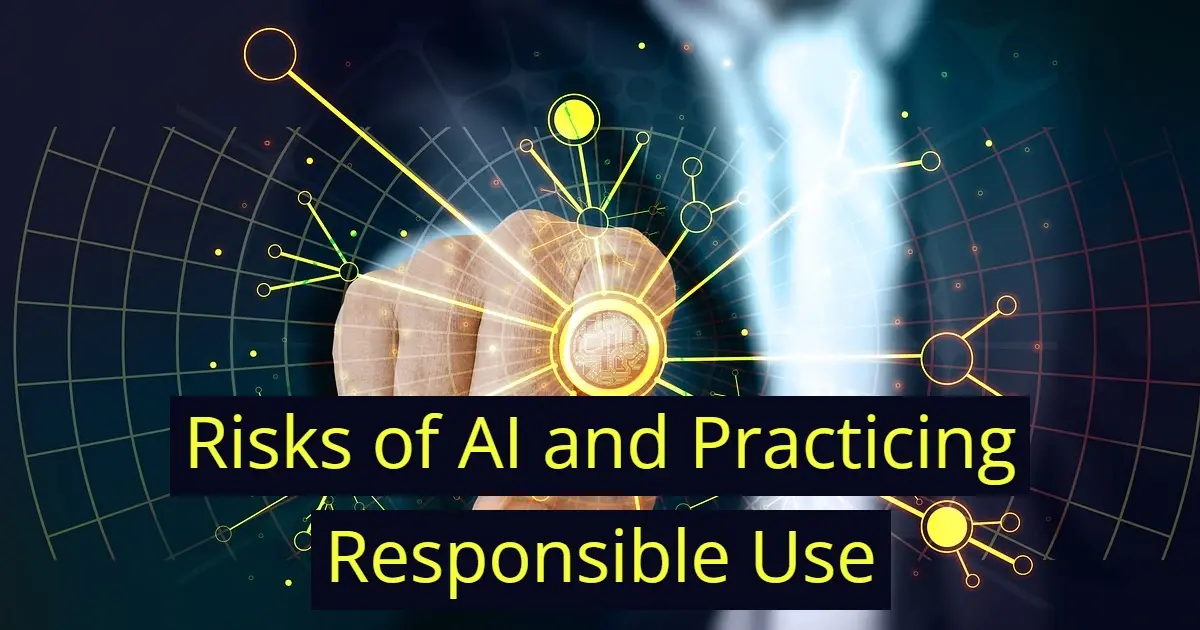Artificial Intelligence (AI) has become an integral part of our daily lives, revolutionizing industries, automating tasks, and enhancing efficiency. However, as AI continues to evolve, so do the risks associated with its deployment. From ethical concerns to potential societal impacts, the responsible use of AI is now more crucial than ever. This article explores the multifaceted risks of AI as well as tips for practicing responsible use.
What is AI?
Artificial intelligence (AI) refers to developing computer systems that are capable of carrying out tasks normally requiring human intelligence. It's the creation of algorithms and models that allow machines to infer from data, recognize patterns, make decisions, and resolve problems. AI systems are capable of adapting and improving their performance over time, in contrast to traditional computer programming which provides specific instructions for certain tasks.
Machine learning, natural language processing, computer vision and robotics are some of the fields covered by artificial intelligence. Machine learning is a subset of artificial intelligence that focuses on the development of algorithms enabling systems to learn from data without explicit programming. These algorithms, based on new information, can find patterns, predict and refine their models over time.
Natural language processing makes it possible for computers to understand, interpret and create human languages so that they can interact with users by means of speech or text. Computer vision is the development of systems capable of interpreting and analysing visual data, which imitates a person's perception.
From virtual assistants like Siri and Alexa to autonomous vehicles, recommendation systems, and medical diagnostic tools, AI applications are diverse. AI technologies are giving rise to opportunities for innovation and efficiency in different sectors, but also bring with them ethics issues such as privacy, bias or job impact.
The Risks of AI
Some of the risks of AI are:
- Bias and Discrimination
- Privacy Concerns
- Job Displacement and Economic Inequality
- Lack of Transparency
- Ethical Dilemmas in Autonomous Systems
- Security Risks
- Unintended Consequences and System Complexity
- Lack of Accountability
- Amplification of Existing Injustices
- Ethical Use in Military and Defense
- Environmental Impact
- Social Manipulation and Deepfakes
Bias and Discrimination
The AI systems learn from historical data, and if there are biases in this data, they may be inadvertently replicated or amplified by algorithms. For example, discrimination can occur due to erroneous data in the training of facial recognition systems which may lead to an unequal impact on some demographic groups. To this end, developers should be cautious when selecting diverse and impartial data sets, applying fairness-aware algorithms to reduce bias in the future, as well as continuously monitor and refine models with a view to mitigating bias.
Privacy Concerns
There are significant privacy concerns with the growing use of artificial intelligence in data analysis and processing. AI algorithms often require vast amounts of personal data to operate effectively, and the mishandling of this data can lead to privacy breaches. Strict privacy standards must be observed when developing neural networks that process confidential information, such as health records or banking data. The responsible use of AI necessitates robust encryption, anonymization techniques, and transparent policies to safeguard individuals' privacy.
Job Displacement and Economic Inequality
The potential for AI to replace certain jobs raises concerns about unemployment and economic inequality. The most vulnerable to automation are routine and repeated tasks, which affect the industries of manufacturing and customer services. In order to address these concerns, responsible artificial intelligence practices involve working with policymakers and teachers to develop strategies for retraining and training the workforce, ensuring that the benefits of artificial intelligence are shared equally across the society.
Lack of Transparency
The opacity of AI algorithms poses a serious risk, since users have no full understanding of the way decisions and predictions are created. Trust in artificial intelligence systems, particularly for crucial applications such as health care or criminal justice, may be undermined by this lack of transparency. Responsible AI practices promote transparency in algorithmic decisions, providing explanations for predictions and ensuring that users can understand and challenge the results of Artificial Intelligence systems.
Ethical Dilemmas in Autonomous Systems
Ethical issues arise from the development of autonomous systems such as self driving vehicles or drones. The AI algorithms have to be able to make quick decisions with ethical implications, like the choice of which car occupants are protected in an emergency situation or pedestrians. Ethical frameworks and guidelines for the design of autonomous systems, dealing with moral issues and ensuring alignment between AI and societal values are part of responsible artificial intelligence practices.
Security Risks
As AI systems become more integrated into critical infrastructure and decision-making processes, they become attractive targets for malicious actors. Adversarial attacks, where input data is manipulated to deceive AI algorithms, pose a serious security risk. Developers must prioritize the robustness and resilience of AI systems, incorporating security measures to detect and defend against potential threats.
Unintended Consequences and System Complexity
The complexity of AI systems makes it challenging to predict all possible outcomes, leading to unintended consequences. As AI systems interact with dynamic environments and evolving datasets, unforeseen issues may arise. Responsible AI practices involve thorough testing, validation, and continuous monitoring to identify and address unintended consequences promptly. Developers must embrace a cautious and iterative approach to AI deployment to mitigate potential risks.
Lack of Accountability
Assigning responsibility for AI outcomes is a complex challenge. When AI systems make decisions that impact individuals or society, it may be unclear who should be held accountable. Responsible AI practices require transparent documentation of decision-making processes, accountability frameworks, and mechanisms to address errors or unintended consequences. Establishing clear lines of responsibility is essential to ensure that AI developers and deployers are held accountable for the impact of their creations.
Amplification of Existing Injustices
If not used responsibly, AI has the potential to exacerbate existing social injustices. For example, predictive policing algorithms trained on biased data can perpetuate discrimination against certain communities. In order to avoid the escalation of current inequalities, good practices in artificial intelligence emphasize that it is important to address fundamental societal issues, promote inclusiveness and regularly evaluate the impact of AI applications on society.
Ethical Use in Military and Defense
The integration of AI in military and defense systems raises ethical concerns regarding the potential for autonomous weapons and the erosion of human control. Responsible AI practices involve establishing international norms and regulations to govern the ethical use of AI in military applications. In order to avoid unintended consequences and escalation, the development and deployment of artificial intelligence in defense should focus on compliance with ethical principles, human oversight and respect for international law.
Environmental Impact
The computational demands of training large AI models contribute to significant energy consumption, leading to concerns about the environmental impact of AI. Responsible AI practices include developing energy efficient algorithms, optimizing hardware infrastructure and exploring sustainable approaches for the development of artificial intelligence. In order to ensure a sustainable and responsible future for artificial intelligence, it is crucial to balance the advantages of AI with its environmental footprint.
Social Manipulation and Deepfakes
The risks to the integrity of information and civic debate are created by an increase in artificial intelligence generated content, such as deepfakes. Deepfakes can be used to create convincing fake video or audio recordings that lead to false messages and manipulation. In order to counter the negative impact of artificial intelligence content on trust and truth in a digital age, responsible AI practices include development of robust detection tools, public awareness campaigns or regulatory measures.
Practicing Responsible Use of AI
Practicing responsible use of AI is essential to ensure ethical, fair, and accountable deployment of this technology. Here are 10 tips to guide individuals and organizations in using AI responsibly:
- Understand the Technology
- Data Privacy and Security
- Transparency
- Avoid Bias
- Human Oversight
- Fairness and Inclusivity
- Accountability
- Continuous Monitoring and Evaluation
- Responsible AI Education
- Regulatory Compliance
Understand the Technology
Stay informed about the capabilities, limitations, and potential biases of AI systems. A solid understanding of how AI works is crucial for responsible use.
Data Privacy and Security
Prioritize data privacy and security when collecting, storing, and processing data. Implement robust measures to protect sensitive information and comply with relevant data protection regulations.
Transparency
Be transparent about the use of AI. Clearly communicate to users, stakeholders, and the public about how AI systems are being used, what data is being collected, and how decisions are made.
Avoid Bias
Actively work to identify and mitigate bias in AI algorithms. Regularly audit and assess AI systems to ensure they do not perpetuate or amplify existing social, cultural, or demographic biases.
Human Oversight
Incorporate human oversight in AI decision-making processes. Humans should have the ability to intervene, interpret results, and correct errors made by AI systems.
Fairness and Inclusivity
Strive for fairness and inclusivity in AI applications. Ensure that AI systems are designed to serve diverse populations without perpetuating discrimination or exclusion.
Accountability
Establish accountability frameworks for AI usage. Clearly define roles and responsibilities for developers, operators, and users, and hold individuals and organizations accountable for the impact of AI systems.
Continuous Monitoring and Evaluation
Regularly monitor and evaluate the performance of AI systems. Implement mechanisms for ongoing assessment, feedback, and improvement to address issues as they arise.
Responsible AI Education
Invest in educating AI practitioners, decision-makers, and the general public about responsible AI use. Promote awareness of ethical considerations, potential risks, and best practices.
Regulatory Compliance
Stay informed about and comply with relevant laws, regulations, and ethical guidelines governing AI use. Proactively engage with regulatory bodies to contribute to the development of responsible AI policies.
In Summary
As AI continues to evolve and permeate various aspects of our lives, understanding and mitigating its risks are imperative. Responsible AI practices involve a collective effort from developers, policymakers, ethicists, and society at large to navigate the challenges posed by AI technologies. By addressing issues such as bias, privacy concerns, job displacement, and ethical dilemmas, we can reduce the risks of AI and foster a future where AI enhances human well-being while upholding ethical standards and societal values. It is crucial to prioritize responsible use, transparency, and accountability to ensure that AI technologies contribute positively to our world.
Frequently Asked Questions
What is the role of artificial intelligence and machine learning in ethical hacking?
AI and machine learning enhance ethical hacking by automating tasks, identifying patterns, and improving threat detection. Ethical hackers leverage these technologies to analyze large datasets and enhance security measures.
How do AI-driven personalized experiences enhance virtual shopping?
AI-driven personalized experiences in virtual shopping leverage algorithms to analyze user behaviour. This analysis enables tailored product recommendations, personalized advertisements, and a more enjoyable shopping journey, mimicking the level of personalization one might experience in a physical store.
What role does User-Generated Content play in influencer marketing?
UGC is integral to influencer marketing. Influencers often create content that inspires their followers to generate their own, forming a cycle of user-generated content that amplifies the reach and impact of influencer campaigns.
What distinguishes successful B2B marketing strategies from conventional tactics?
Successful B2B marketing strategies go beyond conventional tactics by prioritising the establishment of enduring relationships and the consistent delivery of value. This approach, combined with a proactive response to changing market dynamics, sets successful strategies apart in the competitive B2B landscape.

Nile Flores is a long time professional blogger, as well as WordPress website designer and developer from the St. Louis Metro East. Nile blogs at NileFlores.com, where she’s passionate about helping website owners, whether they’re small business owners or bloggers. She teaches about Blogging, Social Media, Search Engine Optimization, Website Design, and WordPress. Additionally, Nile loves to speak at WordCamps (WordPress conferences) across the United States. When Nile isn’t knee-deep in coding, she’s a proud mom of a college student, and enjoys oil painting, cigar smoking, nail art design, and practicing traditional Okinawan kempo karate.
View all posts by Nile Flores




















